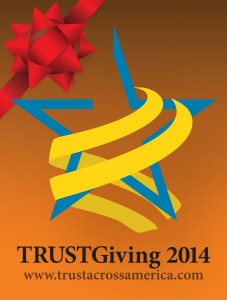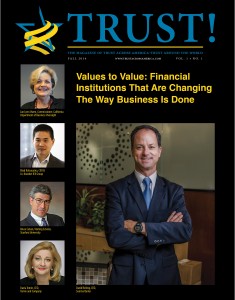Welcome to TRUSTGiving 2014, our first annual weeklong trust awareness campaign. Join the Alliance of Trustworthy Business Experts as our members help our readers navigate the complexities of trust. We will be blogging (several times a day) and posting on Twitter #TrustGiving2014.
Charles H. Green believes that listening is an important component in building trust.
Listening for Leaders
(an excerpt from our third book Trust Inc., 52 Weeks of Activities & Inspirations for Building Workplace Trust out at the end of November)
“Listening” is a core skill in nearly every corporate training department’s toolkit. Trainers, consultants, coaches, sales managers and personal development gurus all sing the praises of doing a better job of listening. And, it makes good common sense as well.
However, the “listening” that is almost always taught is not the listening that is critical to leaders.
The usual meaning of “listening” in business is about improving the efficiency and effectiveness with which the listener extracts information from the client or speaker. Again, this makes good sense. If we want to serve our customers, make the sale, or solve others’ problems, then it’s certainly necessary that we understand all that we can about how they see the problem, the issues. It’s a cognitive aim. The purpose of this kind of listening is served once the problem has been identified and solved.
Indeed, listening-to-extract-information is a necessary tool for helping serve others.
But it is far from sufficient; and it is especially insufficient when it comes to leadership. For that, we need a different form of listening – call it listening for empathy, or listening for validation. The purpose of this kind of listening is not cognitive information extraction: it is about making the speaker, the client, feel understood.
All human beings desire to be understood by others; if we don’t get it, we feel incomplete, un-heard, occasionally resentful and usually less-than-fully cooperative. But if we do get that feeling from the listener, things change. We are validated. We want to cooperate. We desire to reciprocate, and listen to what the listener has to say.
Leaders, above all, need to have their “followers” listen to what they have to say. The best way to get that job done is to listen first – not for problem extraction, but for validation. To be listened to as a leader, first learn to listen.
Charles H. Green is an author, speaker and world expert on trust-based relationships and sales in complex businesses. Founder and CEO of Trusted Advisor Associates, he is co-author of the classic The Trusted Advisor and its practical follow-up, The Trusted Advisor Fieldbook, and author of Trust-based Selling.
Barbara Brooks Kimmel is the Executive Director of Trust Across America-Trust Around the World whose mission is to help organizations build trust. She is also the editor of the award winning TRUST INC. book series and the Executive Editor of TRUST! Magazine. In 2012 Barbara was named “One of 25 Women Changing the World” by Good Business International.
Copyright 2014, Next Decade, Inc.







Recent Comments